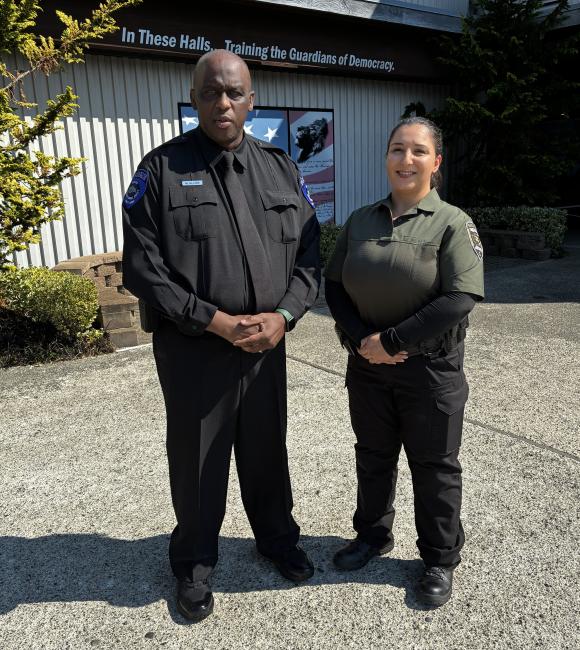When Renee Rafiei stood in her Corrections Officers Equivalency Academy (COEA) classroom, she carried with her the weight of a life shaped by resilience. Born in Tehran, Iran, and raised in the shadow of religious persecution, her family fled so she could have a future beyond the limitations of her faith.
“My role after high school was to get married or find a job working in a store without a real future,” Rafiei said. “My parents decided to leave the country so they could create a future for me.”
Her path wound through Turkey, Detroit, and finally back to Washington, where she chose to serve her community inside the walls of the Franklin County Corrections Center. For Rafiei, every day begins with purpose.
“What gets me out of bed every day is love for this job and love for my coworkers,” she said. “I love to serve my community with them.”
Her story is not unlike that of fellow graduate Michael Allen, who carries a legacy of service spanning from the Gulf War to federal prisons across the country.
“From a young age, I knew what I wanted to do,” Allen said. “I wanted to serve the community.”
Allen’s career has taken him from the Army to the Federal Bureau of Prisons to the U.S. Marshals Service. Even after retirement, he felt his mission wasn’t finished.
“If you can touch one or two people, I think it’s a good day,” he said. “You can’t touch everyone, but if you can put even one person on the right track, you’ve made a difference.”
These two graduates—different journeys, shared calling—came together at WSCJTC through a program built for experienced professionals like them: the Corrections Officers Equivalency Academy.
About the Academy
The Corrections Officers Equivalency Academy (COEA) is an 80-hour, classroom-based program at the Washington State Criminal Justice Training Commission. It’s designed for corrections officers who have already proven their dedication in the field—whether through completing another state’s basic academy or returning after a break in service.
Graduates of COEA earn the same standing as those who complete the traditional academy. Courses cover critical topics including:
- Combating Manipulation
- Professionalism
- Crisis Intervention
- Legal Issues in Jails
- Corrections Officer Survival
- Nobility in Corrections

Shaping the Future of Corrections
For Rafiei, it’s about giving back to a country that gave her family safety. For Allen, it’s about carrying forward integrity and honesty while guiding others onto a better path.
“My legacy is integrity, honesty, and giving 100 percent to get the job done while keeping everyone safe and going home in one piece,” Allen said.
Together, their stories highlight how the Corrections Officers Equivalency Academy transforms experience into leadership. At WSCJTC, it’s more than training—it’s about building guardians of democracy who serve with compassion, professionalism, and purpose.
